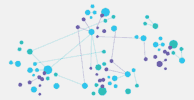
DeepSeek: A Tiny Ripple or a Tsunami in AI?
Conversational AI has taken the world by storm, with ChatGPT and Gemini leading the charge. Microsoft, not one to be left behind, has doubled down with Copilot Chat and Agents for Copilot, making it clear that the future of work is inseparable from AI-powered assistants.
For a while, it seemed like OpenAI, Microsoft, Google, and Meta had a firm grip on the AI space, until a new player from China, DeepSeek, entered the scene. And with a bang. Or so we thought.
A Ripple? More Like a Shockwave!
DeepSeek’s arrival sent tremors through the tech world. The global AI race just got a new contender, and the impact was felt on Wall Street. Some reports suggested that tech stocks took a staggering $3 trillion hit in market value, with Nvidia alone losing over $500 billion in market capitalization. While causation is always tricky to pin down in stock markets, the buzz around DeepSeek was real.
So, What’s the Big Deal?
I’ll be honest, when I first tried DeepSeek, I wasn’t blown away. Sure, it does what ChatGPT and Gemini do, but at a noticeably slower pace. A simple statistics question took 125 seconds, compared to the 5-10 seconds from ChatGPT, Copilot, and Gemini. And let’s not even talk about the dreaded “Server is busy“ error that kept popping up.
But here’s where things get interesting.
DeepSeek claims its model is 95% cheaper to run than ChatGPT. Yes, you read that right, 95% cheaper! Given the billions (possibly trillions) invested in developing ChatGPT and similar AI models, this is a staggering claim.
The magic? Open-source technology and a radically different approach to AI efficiency. Instead of relying on an army of expensive GPUs and cloud storage, DeepSeek optimizes its software algorithms to reduce computational costs. It’s a smart, lean, and potentially game-changing approach.
Democratizing AI, For Real This Time?
If DeepSeek delivers on its promise, it could mark a true democratization of AI, a tool that’s powerful, affordable, and accessible to all.
Of course, as with any disruptive technology, there are concerns. Some fear that AI will chip away at human creativity and imagination, just as the calculator “killed” mental math. But let’s be real: technology reduces errors and levels the playing field, making advanced tools available to everyone, not just the intellectual elite.
As AI becomes more widespread, maybe we’ll shift our focus from IQ to EQ, from raw intelligence to emotional intelligence. But that’s a debate for another day.
A Wake-Up Call for Tech Giants
The real question now is: Will Microsoft, Amazon, and other AI leaders take a page from DeepSeek’s playbook? Affordable AI is great, but it must also be reliable, unbiased, and hallucination-free. That’s the real challenge ahead.
Whether DeepSeek is just a ripple or a full-blown tsunami, one thing is certain, AI innovation isn’t slowing down anytime soon.
DeepSeek vs ChatGPT vs Gemini
As AI models compete for dominance, three key players, ChatGPT, Gemini and DeepSeek, stand out for their unique strengths and weaknesses. Whether you’re looking for cost-effective AI or top-tier language generation, here’s how they stack up.
📖 Further Reading
For more in-depth comparisons and insights into DeepSeek, ChatGPT, and Gemini, check out these articles:
- The Times of India: DeepSeek vs. ChatGPT vs. Google Gemini: How China’s AI Challenger Compares to US Rivals. Read here
- Revolgy: ChatGPT vs. Gemini vs. DeepSeek: Which AI Assistant Is the Best? Read here
- The Guardian: DeepSeek, ChatGPT, Grok… Which Is the Best AI Assistant? Read here
- Dev.to: Is DeepSeek Better Than ChatGPT and Gemini? A Complete Comparison of AI Models in 2025. Read here
- E-Discovery Team: Breaking the AI Black Box: A Comparative Analysis of Gemini, ChatGPT, and DeepSeek. Read here
- arXiv: Gemini vs GPT-4V: A Preliminary Comparison and Combination of Vision-Language Models. Read here
- Bloomberg Originals: How China’s DeepSeek came for Big AI. Watch on YouTube




